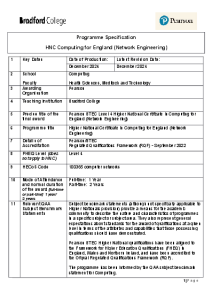HNC Computing for England (Network Engineering)
Study LevelLevel 4 Course TypeHigher Education Duration2 Academic Years Start DateSeptember 2025 Study ModePart-time LocationAdvanced Technology CentreOverview
This course offers you a broad introduction to network engineering. You will be able to demonstrate a sound knowledge of the foundational concepts of computer networks, including hands-on practical experience. You will be able to communicate accurately and appropriately and will have the qualities needed for employment that require some degree of personal responsibility.
In addition to the technical skills and knowledge, you will also gain a range of transferable skills to ensure effective team working, take independent initiative, solve problems and have an adaptable and flexible approach to network engineering, showing resilience under pressure, and meet challenging targets within a given resource.
The course will prepare you for a range of careers in computing, including network engineering, software engineering, data analytics, security, intelligent systems, applications development and testing.
There will also be an opportunity to achieve a vendor accredited certifications. A programme of events bring experts from industry or visiting academics in the subject area to speak to students. The School of Computing runs a series of ‘Tech Talks’ where industry specialists speak with students, local employers and College stakeholders. The School of Computing also holds an annual Student Conference. This features talks from alumni who are now working successfully in industry.
Key Info
You will learn:
• Principles and practices of the contemporary global computing environment
• Organisations, their diverse nature, purposes, structures and operations and their influence upon the external environment
• CPD, staff development, leadership and reflective practice as methods and strategies for personal and people development.
• Computing and computer applications, software development, networking and media systems.
• How technologies interrelate and communicate with one another, support processes and lead to a computerised solution to a problem.
• Programming and coding skills
• Client relationship management and develop appropriate policies and strategies to meet stakeholder expectations.
Transferable skills include self-reflection, including self-awareness, communication, team working, showing resilience under pressure and project management.
- Programming
- Networking
- Professional Practice
- Database Design and Development
- Security
- Planning a Computing Project (Pearson set)
- Computer Systems Architecture
- Website Design and Development
48 UCAS tariff points with a minimum of three GCSEs at Grade C/4 or above and including Mathematics and English. Applicants who do not meet the criteria for Mathematics and English will be considered and will be invited for interview where they will sit a numeracy and literacy skills assessment. The School of Computing welcomes applications from candidates who do not meet the above criteria. Where this is the case, applicants will be invited for interview at which they will be expected to provide a portfolio (either physical or digital) that:
Demonstrates industry experience or a relevant vender qualification in a Computing discipline; OR; Provides examples of computer skills appropriate to Level 4/5 study. Examples could include:
Network administration and automation, Website development, Database design, Programming skills, Network security, Data security
Assessments may include elements of:
- practical assessments;
- portfolios of evidence;
- ‘in class’ tests;
- lab work;
- case studies;
- examinations, both open and closed book;
- reflective activities where you look back over your experiences, analyse them with the assistance of relevant theory and reflective tools, and learn from the experience;
- online discussions that you have had with your peers, tutors and invited contributors to the programme;
- oral and written reports;
- journals, blogs and log books;
- plans (e.g., action plans, plans for your group activities);
- presentations; and
- time-constrained tasks.
- All written work related to assessments will be submitted via Turnitin to ensure authentication of students’ work.
Effectively planned field trips, which have a direct relevance to the syllabus, add value to the learning experience. The Computing team plans a range of visits to conferences, seminars and events during the academic year. These include visits to:
- IPExpo in Manchester
- Leeds Tech User Group
- Tech Huddle in Manchester
- Leeds Digital Job Fair
- UK
World Skills - JISC
Digifest
This is representative of the most common fees scenario, but actual fees can vary depending on a number of factors. Please contact us if you need more guidance.
If you have any questions or require any additional information, please contact [email protected]
Disclaimer: Our prospectus, college documents and website are simply here to offer a guide. We accept no liability for any inaccurate statements and are not responsible for any negative outcomes if you rely on an inaccurate statement. We reserve the right to withdraw any programmes or service at any time.






